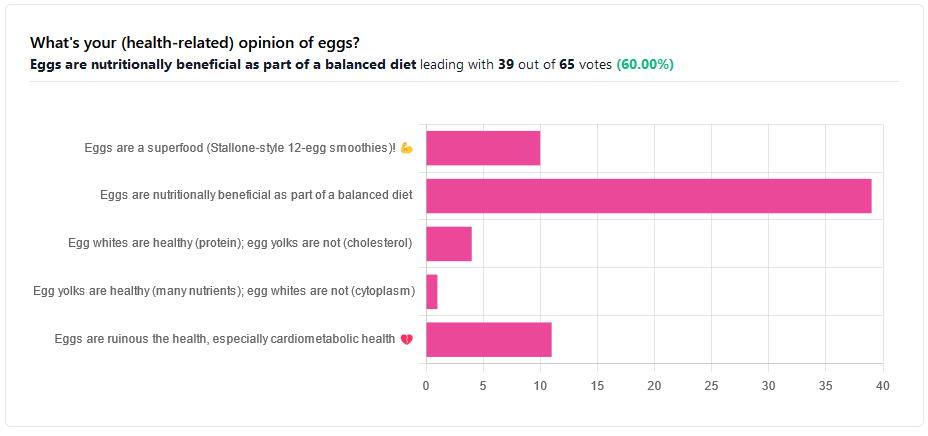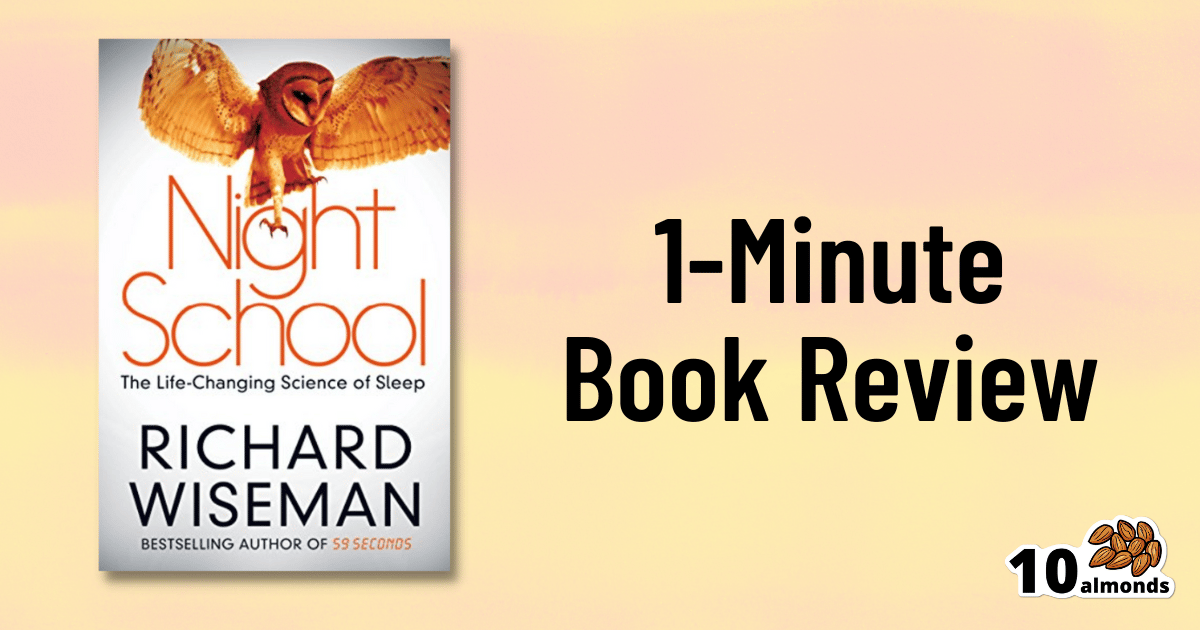
Today’s almonds have been activated by:
Loading Screen Tip: when you can’t find the sunshine, be the sunshine!

⏰ IN A RUSH?
Today’s 30-Second Summary
If you don’t have time to read the whole email today, here are some key takeaways:
“Eggs is good for you”, as the 1960s ad campaign proclaimed. Up to a point, anyway, according to the science of the 2020s!
Enjoyed in moderation, eggs are indeed nutritionally beneficial as part of a balanced diet
The topic of eggs and cholesterol is complex, but a simplified conclusion is that moderate consumption of eggs is broadly considered heart-healthy
Furthermore: moderate consumption of eggs has been found to actually improve healthy cholesterol levels
However, you might want to hold off on the Stallone-style 12-egg smoothies. Research has found that more than 3 eggs per day can start to become harmful to the health, and many studies suggest keeping it to 1–2 eggs per day
Swollen feet, dizziness, and fatigue are all effects of poor circulation
Today’s sponsor, TheRy, are offering compression socks that make a big difference to this, giving comfort and support—without sacrificing style!
Read on to learn about these things and more…

👀 WATCH AND LEARN
Always tired? Here are eight common reasons…
Timestamps ⏰

🥚 MAIN FEATURE
Eggs: All Things In Moderation?

We asked you for your (health-related) opinion on eggs. We specified that, for the sake of simplicity, let’s say that they are from happy healthy backyard hens who enjoy a good diet.
Apparently this one wasn’t as controversial as it might have been! We (for myth-busting purposes) try to pick something polarizing and sometimes even contentious for our Friday editions, and pick apart what science lies underneath public perceptions.
However, more than half (in fact, 60%) of the subscribers who voted in the poll voted for “Eggs are nutritionally beneficial as part of a balanced diet”, which very moderate statement is indeed pretty much the global scientific consensus.
Still, we’ve a main feature to write, so let’s look at the science, and what the other 40% had in mind:
Eggs are ruinous to health, especially cardiometabolic health: True or False?
False, per best current science, anyway!
Scientific consensus has changed over the years. We learned about cholesterol, then we learned about different types of cholesterol, and now we’ve even learned about in some instances even elevated levels of “bad” cholesterol aren’t necessarily a cause of cardiometabolic disorders so much as a symptom—especially in women.
Not to derail this main feature about eggs (rather than just cholesterol), but for those who missed it, this is actually really interesting: basically, research (pertaining to the use of statins) has found that in women, higher LDL levels aren’t anywhere near the same kind of risk factor as they are for men, and thus may mean that statins (whose main job is reducing LDL) may be much less helpful for women than for men, and more likely to cause unwanted serious side effects in women.
Check out our previous main feature about this: Statins: His & Hers?
But, for back on topic, several large studies (totalling 177,000 people in long-term studies in 50 countries) found:
❝Results from the three cohorts and from the updated meta-analysis show that moderate egg consumption (up to one egg per day) is not associated with cardiovascular disease risk overall, and is associated with potentially lower cardiovascular disease risk in Asian populations.❞
Egg whites are healthy (protein); egg yolks are not (cholesterol): True or False?
True and False, respectively. That is to say, egg whites are healthy (protein), and egg yolks are also healthy (many nutrients).
We talked a bit already about cholesterol, so we’ll not rehash that here. As to the rest:
Eggs are one of the most nutritionally dense foods around. After all, they have everything required to allow a cluster of cells to become a whole baby chick. That’s a lot of body-building!
They’re even more nutritionally heavy-hitters if you get omega-3 enriched eggs, which means the hens were fed extra omega-3, usually in the form of flax seeds.
Also, free-range is better healthwise than others. Do bear in mind that unless they really are from your backyard, or a neighbor’s, chances are that the reality is not what the advertising depicts, though. There are industry minimum standards to be able to advertise as “free-range”, and those standards are a) quite low b) often ignored, because an occasional fine is cheaper than maintaining good conditions.
So if you can look after your own hens, or get them from somewhere that you can see for yourself how they are looked after, so much the better!
Check out the differences side-by-side, though:
Stallone-style 12-egg smoothies are healthy: True or False?
False, at least if taken with any regularity. One can indeed have too much of a good thing.
So, what’s the “right amount” to eat?
It may vary depending on individual factors (including age and ethnicity), but a good average, according to science, is to keep it to 3 eggs or fewer per day. There are a lot of studies, but we only have so much room here, so we’ll pick one. Its findings are representative of (and in keeping with) the many other studies we looked at, so this seems uncontroversial scientifically:
❝Intake of 1 egg/d was sufficient to increase HDL function and large-LDL particle concentration; however, intake of 2-3 eggs/d supported greater improvements in HDL function as well as increased plasma carotenoids. Overall, intake of ≤3 eggs/d favored a less atherogenic LDL particle profile, improved HDL function, and increased plasma antioxidants in young, healthy adults.❞
Enjoy!

❤ OUR SPONSORS MAKE THIS PUBLICATION POSSIBLE
Better circulation—without sacrificing style!
As we get older, circulatory problems can lead to all sorts of issues, from swollen feet and ankles, to varicose veins, to the risk of blood clots and even deep vein thrombosis. And the more we sit, the worse it gets! However…
If we must sit for some hours (it happens!) we can greatly reduce any harm done. The solution is simple and well-known: compression socks.
The only problem is, they’re always ugly medical-looking things! Not so with these ones.
TheRy’s ARTG-assessed and TGA-listed compression socks range in design from the stylish to the very cute, and their ultra-soft yarns make them super-comfortable too.
Psst… 10almonds subscribers get an exclusive $10 off any compression sock purchase; just use the code 10ALMONDS10 at checkout 😎
Please do visit our sponsors—they help keep 10almonds free

🌍 AROUND THE WEB
What’s happening in the health world…
More to come tomorrow!

📖 ONE-MINUTE BOOK REVIEW
Night School: Wake up to the power of sleep – by Dr. Richard Wiseman
Sleep is a largely neglected part of health for most people. Compared to factors like food and exercise, it's something that experientially we're mostly not present for! Little wonder then that we also often feel like it's outside of our control.
While Dr. Wiseman does cover the usual advices with regard to getting good sleep, this book has a lot more than that.
Assuming that they go beyond the above, resources about sleep can usually be divided into one of two categories:
Hard science: lots about brainwaves, sleep phases, circadian rhythms, melatonin production, etc... But nothing very inspiring!
Fantastical whimsy: lots about dreams, spiritualism, and not a scientific source to be found... Nothing very concrete!
This book does better.
We get the science and the wonder. When it comes to lucid dreaming, sleep-learning, sleep hypnosis, or a miraculously reduced need for sleep, everything comes with copious scientific sources or not at all. Dr. Wiseman is well-known in his field for brining scientific skepticism to paranormal claims, by the way—so it's nice to read how he can do this without losing his sense of wonder. Think of him as the Carl Sagan of sleep, perhaps.
Style-wise, the book is pop-science and easy-reading. Unsurprising, for a professional public educator and science-popularizer.
Structurally, the main part of the book is divided into lessons. Each of these come with background science and principles first, then a problem that we might want to solve, then exercises to do, to get the thing we want. It's at once a textbook and an instruction manual.
Bottom line: this is a very inspiring book with a lot of science. Whether you're looking to measurably boost your working memory or heal trauma through dreams, this book has everything.

What did you think of today's newsletter?
May today see you well-prepared for the coming weekend,
The 10almonds Team



